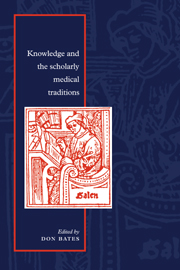Book contents
- Frontmatter
- Contents
- List of illustrations
- List of contributors
- Acknowledgements
- 1 Scholarly ways of knowing: an introduction
- Part 1 Scholarly medicine in the West
- 2 Epistemological arguments in early Greek medicine in comparativist perspective
- 3 Autopsia, historia and what women know: the authority of women in Hippocratic gynaecology
- 4 The growth of medical empiricism
- 5 Scholarship and social context: a medical case from the eleventh-century Near East
- 6 The experience of the book: manuscripts, texts, and the role of epistemology in early medieval medicine
- 7 Artifex factivus sanitatis: health and medical care in medieval Latin Galenism
- 8 Epistemology and learned medicine in early modern England
- Part 2 Chinese traditional medicine
- Part 3 Āyurvedic medicine
- Part 4 Commentaries
- Index
7 - Artifex factivus sanitatis: health and medical care in medieval Latin Galenism
Published online by Cambridge University Press: 01 February 2010
- Frontmatter
- Contents
- List of illustrations
- List of contributors
- Acknowledgements
- 1 Scholarly ways of knowing: an introduction
- Part 1 Scholarly medicine in the West
- 2 Epistemological arguments in early Greek medicine in comparativist perspective
- 3 Autopsia, historia and what women know: the authority of women in Hippocratic gynaecology
- 4 The growth of medical empiricism
- 5 Scholarship and social context: a medical case from the eleventh-century Near East
- 6 The experience of the book: manuscripts, texts, and the role of epistemology in early medieval medicine
- 7 Artifex factivus sanitatis: health and medical care in medieval Latin Galenism
- 8 Epistemology and learned medicine in early modern England
- Part 2 Chinese traditional medicine
- Part 3 Āyurvedic medicine
- Part 4 Commentaries
- Index
Summary
Introduction
In his commentary on Aristotle's De sensu et sensato, written in 1269, Thomas Aquinas did not hesitate to define the physician to his students as the artifex factivus sanitatis, the maker of health. The context in which this attractive definition arose was the relationship between natural philosophy and medicine, a problem that greatly concerned medieval scholars, whether they were physicians or not, in the period between the twelfth and fourteenth centuries. For this reason, Latin European students were confronted with a question that was by no means trivial and in no sense abstract: what was the difference, in intellectual and practical terms, between two activities that had emerged from the newly founded universities of the time. I refer, on the one hand, to the new, university-trained physicians, educated according to the Galenic paradigm following an intellectual model that was increasingly clearly defined in the Latin West in the twelfth century, and, on the other, to the natural philosophers, who had become firmly established in the already influential Schools of Arts. Neither of these two groups of ‘professionals’ could remain detached from such important human phenomena as health and illness, at both the individual and collective level. In case of the physicians, this was for obvious reasons; in the case of the natural philosophers, their intellectual discipline could not remain detached from anything connected with the human being. ‘It is the task of the natural philosopher’, commented Thomas Aquinas,
to investigate the primary and universal principles that govern health and illness; it is the physician's to put these principles into practice, in keeping with the idea that he is the maker of health … […]
- Type
- Chapter
- Information
- Knowledge and the Scholarly Medical Traditions , pp. 127 - 150Publisher: Cambridge University PressPrint publication year: 1995
- 3
- Cited by



